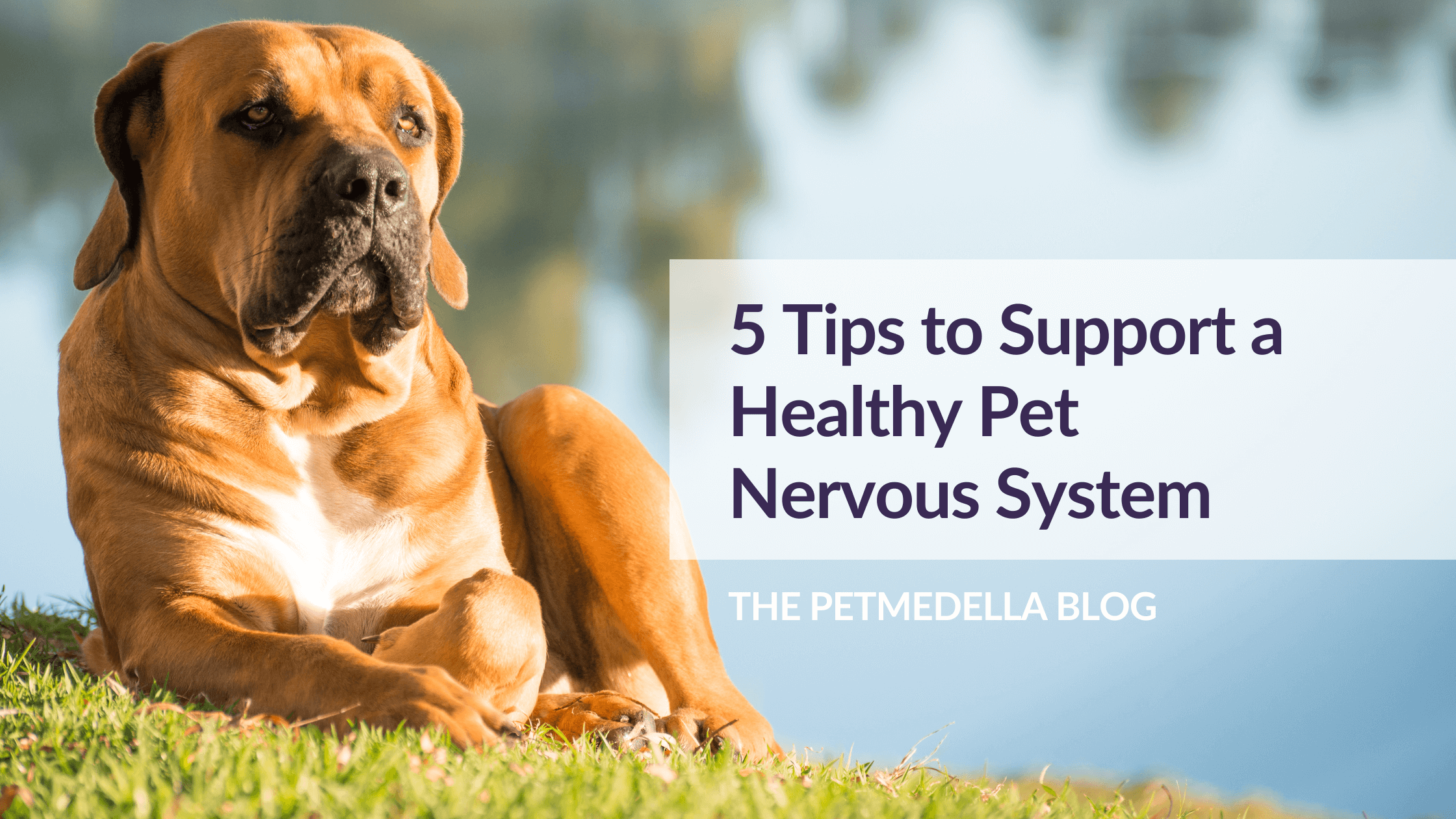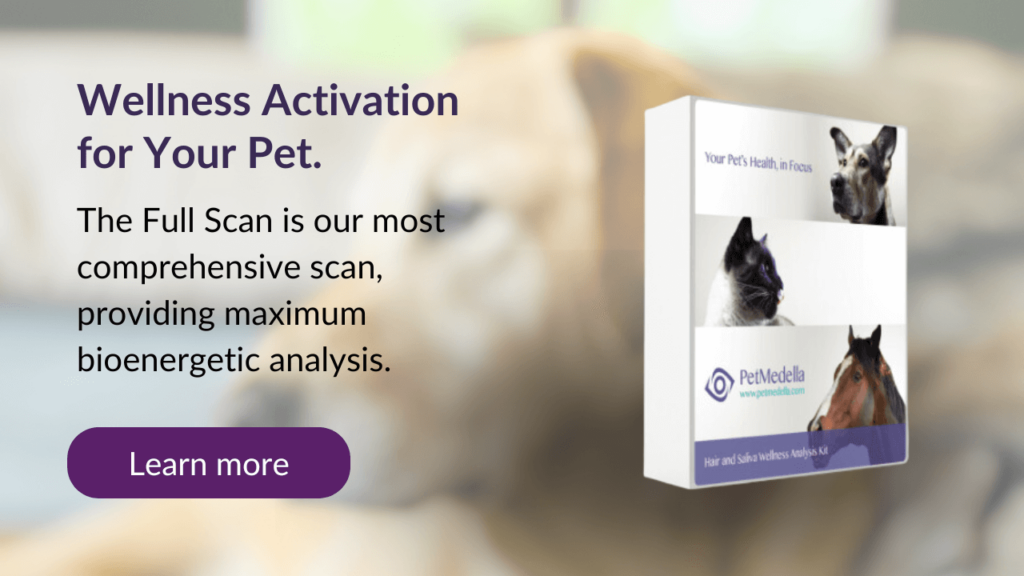
How Does Your Pet’s Nervous System Show up on a Bioresonance Scan?
Does your cat dart through the house at the sound of a tuna can opening?
Or does your dog respond to your commands to sit, lay down, or roll over with unwavering enthusiasm? What controls these abilities? The answer lies in your pet’s nervous system—a sophisticated network of cells and signals that orchestrate every movement, sensation, and behavior.
Just like in humans, the nervous system in cats and dogs is the central command center, guiding their responses to the world around them. But what exactly happens in your pet’s nervous system, and how can we gain insights into its health?
This is where bioresonance scans come into play. Our PetMedella scans can show any resonating stress in your pet’s body systems, providing clues about their overall well-being.
Some of those clues lie in the 14 organ systems themselves and the way they influence each other. Let’s look at the Digestive System. It is linked to your pet’s nervous system through the gut-brain axis.
Pets share the same physiological system that humans do. One affects the other and vice versa. This gut-brain axis can influence everything from the absorption of food to behavior!
The connection between these two systems (and the stress between them) is a common bioresonance scan finding on reports.
Just remember – we don’t diagnose medical conditions! Please consult your veterinary practitioner.
Understanding your pet’s nervous system requires looking at its intricate components and functions. In this blog, we’ll explore how the nervous system operates in cats and dogs, with some cool facts and differences between the species! We’ll also cover 5 tips to support a healthy pet nervous system!
Think of Your Pet’s Nervous System as a Command Centre
The nervous system in cats and dogs is as complex and crucial as it is in humans. It regulates and coordinates their bodily functions, behavior, and responses to stimuli. Here’s a deeper look at its components:
- Central Nervous System (CNS): This includes the brain and spinal cord. The brain is the control center for processing sensory information, making decisions, and coordinating movement. The spinal cord acts as a conduit, transmitting signals between the brain and the rest of the body.
 Cats: Their brains have specialized areas for processing sensory information related to hunting and navigating tight spaces. The cerebellum, responsible for motor control and coordination, is particularly developed in cats for agility.
Cats: Their brains have specialized areas for processing sensory information related to hunting and navigating tight spaces. The cerebellum, responsible for motor control and coordination, is particularly developed in cats for agility.
Dogs: Their larger brains have expanded regions dedicated to smell and social behaviors. The limbic system, which handles emotions, is well-developed to support complex social interactions.
- Peripheral Nervous System (PNS): This network includes all the nerves outside the CNS. It connects the CNS to limbs and organs, allowing for voluntary movements and automatic processes such as breathing and digestion.
 Cats: Use their whiskers (vibrissae) as an extension of their sensory system, providing detailed information about their environment, especially in low-light conditions. They are highly sensitive and can detect even slight changes in their environment, aiding in navigation and prey detection.
Cats: Use their whiskers (vibrissae) as an extension of their sensory system, providing detailed information about their environment, especially in low-light conditions. They are highly sensitive and can detect even slight changes in their environment, aiding in navigation and prey detection.
Dogs: Rely on their sense of smell, which can detect pheromones and other chemical signals from other animals, playing a key role in social interactions and behavior. Their sense of smell is up to 100,000 times more acute than humans, allowing them to detect scents and pheromones from miles away.
SCAN TIP: It’s common for Full Scans to reveal stress in the Nervous System Dial. The notes section may also show points like the CNS and PNS (central and peripheral nervous system) as well as the governing vessel. In Traditional Chinese Medicine, the governing vessel indicates a waning of your pet’s overall energy. Don’t be concerned! Many factors, such as poor gut health, toxins, nutritional imbalances, and emotional factors, can contribute to governing vessel stress.
Common Health Issues Related to Your Pet’s Nervous System
Neurological disorders can significantly impact your pet’s health and well-being. Here are some common conditions that pets can experience:
- Hydrocephalus: This condition involves an abnormal buildup of cerebrospinal fluid (CSF) in the brain. It can result from increased production, decreased absorption, or blockage of CSF, leading to increased pressure on the brain and behavioral and neurological issues.
- Canine Cognitive Disorder: Similar to Alzheimer’s disease in humans, this age-related condition involves degeneration of brain cells and buildup of beta-amyloid protein, leading to memory loss, disorientation, and anxiety. Clinical signs can mirror human dementia, including getting lost in familiar places and increased anxiety. Simple homeopathic remedies, like Ultimate Rescue, can shine here as safe additions to help ease anxiety in your pet.
- Intervertebral Disk Disease (IVDD): This disorder affects the spinal cord and can be traumatic or degenerative. In degenerative cases, the cushioning material between vertebrae becomes brittle and can bulge, causing pain and neurological symptoms. Traumatic IVDD involves sudden expulsion of this material into the spinal canal, potentially leading to severe symptoms, including paralysis.
- Seizures: Seizures can be caused by various factors such as trauma, infections, toxins, or nutritional issues. They may be focal (affecting only part of the brain) or generalized (affecting the entire brain and body).
Understanding Stress and Its Effects on Your Pet’s Nervous System
Stress has a profound impact on a pet’s nervous system. Chronic stress can impair the brain’s ability to produce new neurons and maintain healthy connections. This constant state of stress can hinder the nervous system’s healing and function. Without the regular generation of neurons, the brain struggles to maintain the healthy connections necessary for optimal cognitive function. This can manifest as decreased mental sharpness, altered behavior, and even heightened sensitivity to environmental changes.

SCAN TIP: There’s a lot of information on how EMFs (electromagnetic frequencies) affect the brain. EMFs are a common environmental stressor that frequently appears in reports for both people and pets. They may impact organs like the thyroid along with the Nervous System. If your pet enjoys lounging with you while you work on your laptop, consider taking breaks to step away from those EMFs—for both of you.
Pets under chronic stress may exhibit symptoms such as anxiety, irritability, and behavioral changes, which can further complicate their overall well-being.
Additionally, stress is closely linked to gut health. If your pet has digestive issues – pay close attention to the nervous system.
The gut is often referred to as the “second brain” due to its extensive network of neurons and its role in producing neurotransmitters like serotonin, which influence mood and behavior. When a pet experiences digestive issues, it can signal underlying stress, impacting both the gut and the nervous system.
Maintaining a healthy digestive system with a balanced microbiome supports overall brain and nervous system health. Pet probiotics can be particularly beneficial for maintaining gut health and, consequently, nervous system function.
5 Tips To Support a Healthy Pet Nervous System
- Detoxify Your Pet’s Surroundings:
- Toxins like pesticides, heavy metals, and household chemicals can significantly impact a pet’s nervous system. Pets are often more vulnerable to these toxins due to their smaller size and proximity to the ground where many toxins settle.
- Regularly clean your pet’s bedding, toys, and living spaces with non-toxic, pet-safe products. Additionally, consider filtering your pet’s drinking water to remove potential contaminants, and avoid using lawn treatments or pesticides that could be harmful if ingested or absorbed through the skin.
- Provide Nutritional Food and Exercise:
- Nutritional Support: The pet nervous system requires specific nutrients to function optimally. Omega-3 fatty acids, found in fish oil and flaxseed, have been shown to support cognitive function and reduce inflammation in the nervous system. B vitamins, particularly B6, B12, and folic acid, play crucial roles in the maintenance of healthy nerve cells and neurotransmitter production. Additionally, antioxidants like vitamin E and selenium protect nerve cells from oxidative stress.
- Exercise: Regular physical activity helps neural plasticity—the nervous system’s ability to adapt and reorganize itself. Exercise increases blood flow to the brain, promotes the release of endorphins, and reduces the levels of stress hormones like cortisol. This, in turn, helps maintain mental health, reduces anxiety, and supports overall neurological function. Engaging your pet in activities that challenge their brain, such as puzzle toys or agility training, can also enhance cognitive function.
- Reduce Stress:
- Creating a stable and calm environment for your pet is key. Establish consistent daily routines and provide a safe space for your pet to retreat to. Additionally, regular interactive playtime can serve as a stress outlet, keeping your pet mentally and physically stimulated.
- Discover Balancing Supplements
- In addition to omega-3 fatty acids and B vitamins, other supplements can further support nervous system health.
- Ginkgo Biloba is a remedy that supports longevity and increases circulation to the brain.
- Flower Essences are calming options to help balance the nervous system by targeting emotional energy. These can work similarly in pets as in humans!
- Want to know which supplements resonate for your pet at this time? Consider a Remedy Scan.
- Consider Complementary Therapies:
- Techniques such as acupuncture, chiropractic care, and massage can offer additional support for your pet’s nervous system. These techniques not only help alleviate stress and tension but also promote overall well-being, creating a soothing and balanced environment for your furry friend.
Supporting your pet’s nervous system involves a holistic approach that combines proper nutrition, mental stimulation, relaxation, and regular veterinary care.
By understanding and addressing their unique needs, you contribute to their overall well-being and happiness. With the right care, your cat or dog can thrive, maintaining a healthy and balanced nervous system throughout their life.

